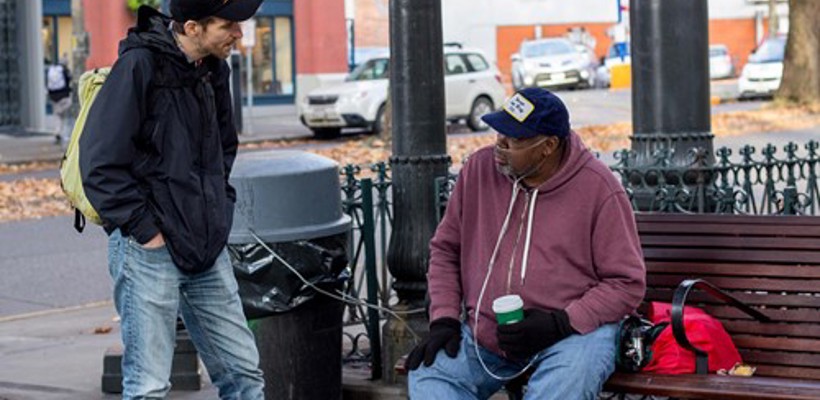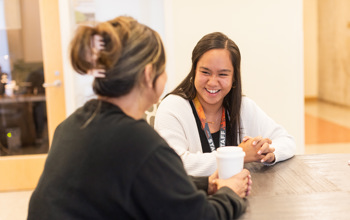How to support someone with a mental illness
Larry Clum - October 16 2017Homelessness, Mental Health

“Why would someone want to live that way?”
It’s a question you’ve probably asked when you’ve seen homeless people in Seattle.
The freeway camps littered with trash. The tattered unwashed clothing. The shivering humans sleeping in damp doorways.
All of it is heartbreaking and confusing. Why would someone embrace a life on the street?
The unfortunate reality is that many who suffer from a mental illness like schizophrenia, enter into isolation and have difficulty maintaining a functional life.
Imagine your reality was terrifying – hearing derogatory voices or believing that the world is conspiring to kill you. One minute you’re positive and energetic, and the next you’re spiraling into a deep depression.
“Often the person with the illness doesn’t even believe that they are in need of help,” says Larry Clum, the Mission's Director of Mental Health Services. “Additionally, mental illness puts a strain on a person’s closest support systems, often resulting in shame, isolation and abandonment.”
So what can be done for homeless people living in Seattle with a serious mental illness?
Helping someone quiet the disturbing inner voices or repair a fractured mental state takes care over the long haul.
“It can take weeks, months, or even years of companionship before someone with a serious mental illness is willing to enter into a trusting relationship,” says Clum.
If it sounds hopeless, it’s not. The Mission is on the front lines of this problem, offering a lifeline to those with mental illness on the streets.
The Mission has connections with downtown resources that get people placed in outpatient care, addiction recovery care, housing or job placement. “Substance use is a common coping mechanism for people with mental illness,” says Clum. The organization also trains members of the public on Mental Health First Aid so that genuine companionship can be offered to these silent sufferers on our streets.
So when you encounter a homeless person with mental illness what should you do? What’s best for them?
“We worry so much these days about enabling those who are homeless, addicted or mentally ill, that we think we are better off not to engage them,” says Clum. “This has been a huge mistake. ‘The Seattle Freeze’ is that look of indifference and apathy that says, ‘you just keep to yourself and I’ll keep to myself.’”
The most devastating effect of mental illness is the separation from others in society.
While a brief interaction won’t cure a lifetime of issues, here are some tips for offering mental health first aid.
Know the signs. One of the big hallmarks of mental illness is “a break from reality.” For example, experiencing a delusion (false belief) that the government is putting nanobots with cameras in tap water to spy on them.
Give space. Be careful to take time beforehand to observe the person from afar and then approach in a “safe space” for both you and the person.
Reassure. If you feel safe and able to have a conversation, briefly offer reassurance while listening nonjudgmentally. Remember that people experiencing mental illness are rarely violent unless they’re threatened. Offering occasional reassurance can have a huge impact on someone in distress.
Be a good neighbor. Be kind and curious with an attitude of genuine acceptance and empathy. Lean in instead of leaning away. Simply say hello, give a smile, offer your name and see where that might take you.
Refer. If the person seems open, you may be able to recommend a local resource by calling the King County Crisis Line (206) 461-3222. If the person appears to be too agitated for conversation, and under such distress that safety could be an issue, call 911.
Staff and volunteers at the Mission encounter persons with mental health issues every single day. They arrive at the Mission hungry and cold. Workers at the Mission get to know their names and stories. Once they establish a relationship, they can help them on the road to being an engaged and productive member of society.
But they can’t do it alone. This season, consider getting certified in Mental Health First Aid. Get in touch with Larry – lclum@ugm.org or (206) 432-8476 and ask to register for the next training class or request an in-house training for a group of twenty to thirty persons.
With the right care, those with mental illness can start getting the treatment they desperately need.




